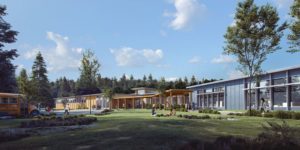This blog was originally posted by Hartford Courant on August 25, 2020.
Written by Jesse Leavenworth.
Both projects will use roof-mounted solar panels and geothermal wells. Plans also focus on reducing energy demand through lighting, window placement and strategic IT design, the architects said in a news release Tuesday.
The renovation and addition project at Buckley Elementary School in Manchester and construction of a new Mansfield Elementary School are both to begin next year.
Both projects will use roof-mounted solar panels and geothermal wells. Plans also focus on reducing energy demand through lighting, window placement and strategic IT design, the architects said in a news release Tuesday.
“Connecting the school community to the environmental mission of their learning space will provide a rich opportunity for an ongoing dialog about sustainability,” the release said.

Net-zero buildings are more expensive than other types of construction because electrical generating features such as solar panels have to be added. Manchester is in the second phase of a school modernization and repurposing project that voters approved last year. The Buckley renovation and expansion price tag is $29 million, with taxpayers responsible for about $12 million after state reimbursement, town General Manager Scott Shanley said.
Town leaders added 5% to the estimated construction costs for the Buckley project and two other “like-new” school renovations and expansions to reach for the net zero goal.
“At the time, we were clear that it was an elusive goal as the buildings already exist in a particular configuration and on a fixed site — both of which can be barriers,” Shanley said.
However, he continued, “We are excited because we believe we can achieve the goal with Buckley.”
“Five years from now, net zero is going to be standard language in every (request for proposal),” TSKP partner Randall Luther said. “We’ve always been known for straightforward, compact, efficient buildings, and net zero is single-mindedly focused on getting your energy usage down and your carbon usage down.”
TSKP partnered with CMTA and Kohler Ronan, sustainability consulting engineering firms with experience in net zero projects, the architectural firm said.
Jesse Leavenworth can be reached at jleavenworth@courant.com

